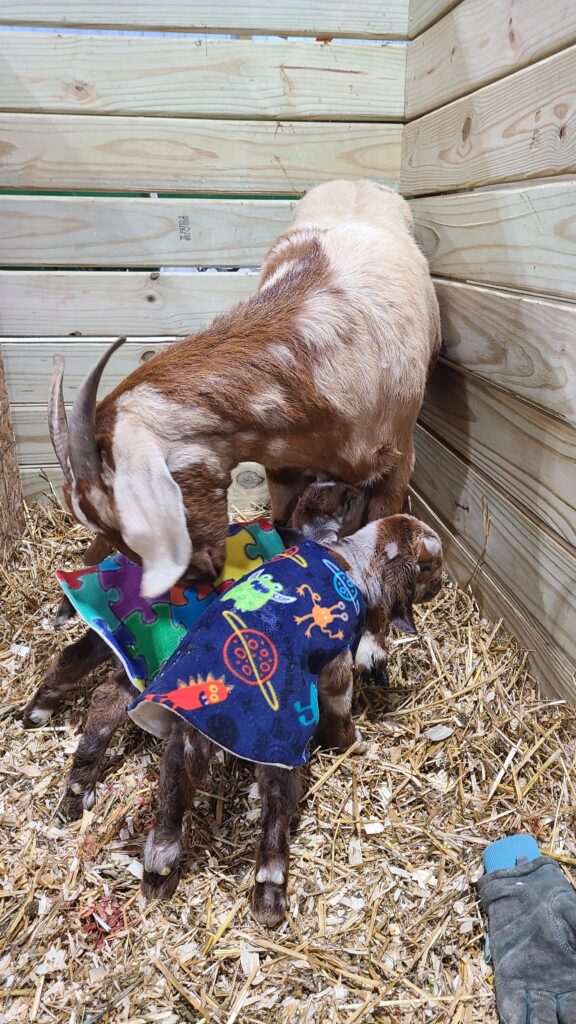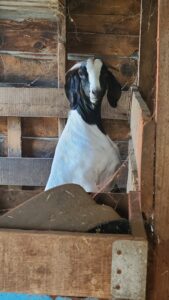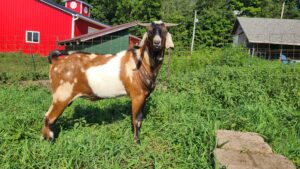Both male and female goats grow horns naturally, unless they are polled. Here are the reasons we let the goats on our farm keep their horns. Some of the reasons may surprise you!

This post contains affiliate links. As an Amazon Associate, I earn from qualifying purchases.
I raise Boer and Nubian goats. Some of them have horns and some do not.
There are definite pros and cons to keeping horned goats. Here, I will make a case for foregoing disbudding or dehorning and letting your goats keep their crowns of glory.
Read on, and decide for yourself what is best for your own animals and situation.
1. Goats with Horns can Defend Themselves
Letting your goat keep her horns will not make her more aggressive.
Horns are an asset from a defensive standpoint. Goats with horns can defend themselves more easily from higher-ranking herd members. They can also use them to ward off predators or protect their offspring.
2. Goats with Horns May Regulate their Temperature Better
It is thought that horns help goats regulate their body temperature. For this reason, it is recommended that Angora and other fiber producing goats with thick wooly hair never be disbudded or dehorned.
3. Goats with Horns are Natural
Unless your goats are polled (genetically lacking horns), both the males and females naturally grow horns. Some grow out sideways, some grow backwards, and others spiral around the ears. Regardless of shape and orientation, horns on goats are completely normal!
If you wish to raise and manage goats holistically, you might opt for letting your goats grow horns. Disbudding and dehorning can be painful for the animal and may require inputs such as vaccination prior and medication administration afterwards. Further, disbudding and dehorning procedures do pose risk of injury, and even death, for the goat if not completed appropriately.

4. Goats with Horns can Scratch their Backs
My horned goats are lucky because they have built-in back scratchers, one for each side! When they want to use them, they simply turn their head and direct the tip of their horn right into the itchy spot. It looks like it feels so satisfying! The non-horned goats, on the other hand, have to resort to the scratching posts we provide them.
For directions on making your own scratching post for goats, click here to read my how-to article!
5. Goats with Horns Meet Certain Breed and Show Standards
The American Boer Goat Association breed standard for does and bucks includes horns. However, Boer wethers cannot be shown with horns per our 4-H regulations.
My horned Nubians of either sex, on the other hand, cannot be shown. This is congruent with the American Dairy Goat Association rules.
Therefore, if you are considering exhibiting your animals in the showring, I recommend looking into rules and disqualifications beforehand.
6. Goats with Horns are Easier to Handle
A goat’s horn can serve as a handle to steady the animal for drawing blood, giving medication, and doing other quick herd management tasks. Holding onto the horns allows you better control than what you can achieve with a collar or halter.
That being said, never tie or walk a goat using its horns! Handling a goat by the horns should be reserved for very short periods of time and duties that require precision and the animal being very still.
7. Goat Horns give Clues about the Animal’s History
A goat’s horns continue to grow throughout its lifespan. You can estimate a goat’s age compared to others by the length and diameter of its horns.
That being said, horn growth is dependent on nutrition. A goat that is malnourished or has a deficiency of a specific nutrient will have smaller than normal horn growth.
You can keep your goats, and their horns, healthy by providing them with loose minerals and salt as free-choice supplements. For ideas on how to give your goats minerals, follow the link here to read my article.
8. Goats with Horns are Badass
Ok, this one is purely my personal opinion, but I do think horned goats are pretty cool! Goats with horns look more powerful and majestic than their dehorned, disbudded, or polled counterparts. I feel horns add to a goat’s personality and attractiveness.
Disadvantages of Having Horned Goats
Even though I prefer to let the goats on my farm have horns, I acknowledge that there are a few disadvantages to this practice.
Goat horns can get caught in fences. In the 3 decades I have owned goats, I have had a few get trapped, but thankfully, I have been able to turn them loose each time without any negative consequences. This is probably due to the fact that I check on my animals several times daily.
A goat’s horn could cause injury to a person or another animal. There is no doubt that getting hit by a horned goat will hurt more than getting hit by a goat without horns. For this reason, aggressive or fearful animals should only be handled by those with experience.
I have heard horror stories about goats fighting, udders getting damaged, and eye injuries, but have never experienced this with my animals. Given enough food, shelter, and space I find that there is little to squabble over and the pushing and shoving never gets out of hand.

Now, it is up to you to weigh the pros and cons and decide whether horns or no horns is best for your goats!

Mother, farmer, author, and teacher by trade… She loves tending to things and watching them grow!

I certainly agree with each valid point you make. Just as I believe docking ears and tails on dogs is unnecessary !!!